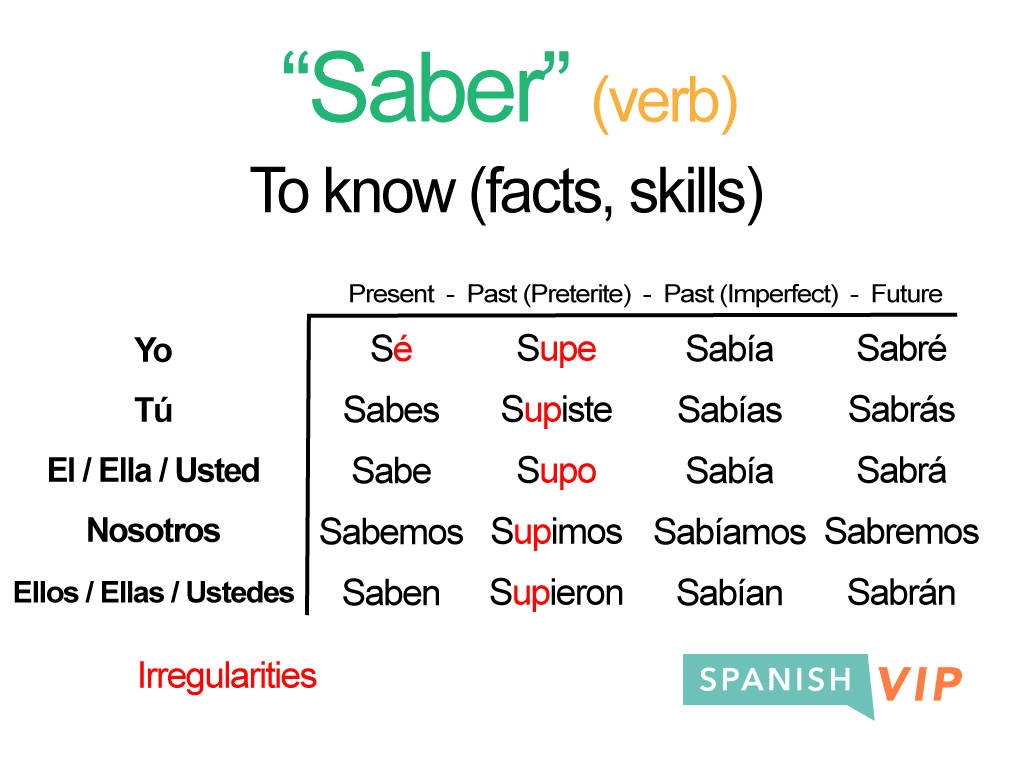
Spanish Verbs: Understanding Saber Conjugation
DATE:
Verbs are usually the most important part of speech because they explain the core functionality of a sentence. From a language-learning perspective, it is important to thoroughly study them and their complex conjugations.
Of course, as a Spanish learner, you don’t need to study each verb and its conjugations one by one, as it would take you forever to learn them all! But a good recommendation is that you study the most common ones, especially if they are irregular verbs.
In this article, we will be talking about a very common irregular verb: saber (to know). We will be sharing the saber conjugation and other crucial information about this widely used verb!

The Spanish Verb Saber
Saber might be in the top 10 most common verbs in Spanish, it’s an irregular verb and means “To know in English, however, “To know” means two different things in Spanish, “Saber” and “Conocer”.
Saber vs Conocer
In Spanish, there are two verbs that express the same idea of “to know”: saber and conocer. It’s important to know the differences between the two because they’re not interchangeable. Let’s learn the meaning of these two very important verbs!
Saber
Saber is commonly used to express facts, learned skills, or information that you memorized. For example:
- Yo sé reparar autos. – I know how to repair cars.
- Jessica no sabe hablar español. – Jessica can’t speak Spanish.
- Ellos saben quién fue el que se comió las galletas. – They know who ate the cookies.
Conocer
Conocer, on the other hand, is used when you want to express that you know a person, a place, or a thing (for example knowing the existence of a book or a movie). For example:
- Conozco un restaurante que está muy cerca. – I know a restaurant that is very close
- ¿Conoces a Ricardo? ¡Es un amigo mío! – Have you met Ricardo? He is a friend of mine!
- ¡Conozco un libro muy bueno! – I know a very good book!
Spanish Verb Saber Conjugation
Indicative Conjugation of Saber
Here’s a table with the basic saber verb conjugation in past, present, and future conjugation with some examples
|
Subject |
Present |
Preterite |
Imperfect |
Future |
Conditiona |
|---|---|---|---|---|---|
|
Yo |
Sé |
Supe |
Sabía |
Sabré |
Sabría |
|
Tú |
Sabes |
Supiste |
Sabías |
Sabrás |
Sabrías |
|
Él, Ella, Usted |
Sabe |
Supo |
Sabía |
Sabrá |
Sabría |
|
Nosotros |
Sabemos |
Supimos |
Sabiamos |
Sabremos |
Sabríamos |
|
Ellos, Ellas, Ustedes |
Saben |
Supieron |
Sabían |
Sabrán |
Sabrían |
For example:
Nosotros sabemos hablar en español. – We know how to speak Spanish.
¡Tú supiste cocinar bíen el otro día! – You knew how to cook well the other day!
- Imperfect tense:
Yo sabía como arreglar bicicletas, pero ya se me olvidó. – I knew how to fix bikes, but I already forgot.
Tú sabrás dibujar bien, solamente tienes que practicar todos los días. – You will know how to draw well, you just have to practice every day.
Ellos sabrían cantar si solamente practicaran. – They would know how to sing if they only practiced.
Saber Conjugation: Compound Tenses of the Indicative Mood
|
Subject |
Present Perfect |
Preterite Perfect |
Past Perfect (Pluperfect) |
Conditional Perfect |
Future Perfect |
|---|---|---|---|---|---|
|
Yo |
he sabido |
hube sabido |
había sabido |
habría sabido |
habré sabido |
|
Tú |
has sabido |
hubiste sabido |
habías sabido |
habrías sabido |
habrés sabido |
|
Él, Ella, Usted |
ha sabido |
hubo sabido |
había sabido |
habría sabido |
habré sabido |
|
Nosotros |
hemos sabido |
hubimos sabido |
habíamos sabido |
habríamos sabido |
habremos sabido |
|
Ellos, Ellas, Ustedes |
han sabido |
hubieron sabido |
habían sabido |
habrían sabido |
habrán sabido |
For example:
He sabido como usar esta cámara. – I have known how to use this camera.
- Preterite perfect tense:
Ellos hubieron sabido cómo salir de ese lugar a tiempo. – They would have known how to get out of that place in time.
Ella había sabido cómo cocinar la pizza. – She had known how to cook pizza.
- Conditional perfect tense:
Tú habrías sabido cómo bailar si hubieras practicado. – You would have known how to dance if you had practiced.
- Future perfect tense:
El próximo año habremos sabido como construir esas casas. – Next year we will have known how to build those houses.
Saber Conjugation: Subjunctive Mood
The subjunctive is a verb mood that is used to express possible, desired, or hypothetical statements, in other words, statements that are not actually happening or are uncertain to happen.
|
Subject |
Present |
Imperfect 1 |
Imperfect 2 |
Future |
|---|---|---|---|---|
|
Yo |
sepa |
supiera |
supiese |
supiere |
|
Tú |
sepas |
supieras |
supieses |
supieres |
|
Él, Ella, Usted |
sepa |
supiera |
supiese |
supiere |
|
Nosotros |
sepamos |
supiéramos |
supiésemos |
supiéremos |
|
Ellos, Ellas, Ustedes |
sepan |
supieran |
supiesen |
supieren |
QUICK TIP
Imperfect 1 and imperfect 2 are interchangeable. The second form might be considered the “traditional” form of the past subjunctive, while imperfect 1 comes from an old Latin indicative form.
For example:
¡Ella quiere que sepas que te quiere mucho! – She wants you to know that she loves you very much!
Es importante que ustedes supieran lo mucho que los aprecio. – It is important that you know how much I appreciate you.
- Future Subjunctive:
Ella no cree que tú supieres que es lo que hay en la caja. – She doesn’t think you know what’s in the box.
Saber Conjugation: Imperative Mood
The imperative mood, in Spanish grammar, is used to give orders or commands, which can be affirmative or negative. This mood has fewer subjects to conjugate since you cannot give an order to yourself or to a third person.
|
Subject |
Affirmative |
Negative |
|---|---|---|
|
Tú |
sabe |
no sepas |
|
Nosotros |
sepamos |
no sepamos |
|
Ustedes |
sepan |
no sepan |
For example:
- Affirmative example:
¡Sabe que hoy no saldrás! – You know you won’t go out today!
- Negative example:
¡No sepas la verdad! – Don’t know the truth!
Other important notes about the verb Ser
Is it “sé” or “se”?
“Sé” (with a tilde) is the first-person conjugation of the verb saber in the present tense, on the other hand, “se” is a reflexive pronoun.
- ¡Sé hablar otros idiomas! – I know how to speak other languages!
- Se está preparando. – He’s getting ready.
Saber (to know) vs saber (to taste)
The verb saber (to know) can be confused with the verb saber (to taste). The conjugation for both is exactly the same:
Este helado sabe a pistacho. – This ice cream tastes like pistachio.
QUICK NOTE
Please note that saber (as in “to taste”) refers only to how something tastes, e.g. “este pastel sabe genial” (this cake tastes great). It cannot be used to express one tasting something, e.g. “would you like to taste the cake?” or “let me taste it”; in these cases, the correct Spanish verbs would be probar or saborear.
Saber as a noun
The verb saber can also work as a noun, and it can be translated to wisdom or knowledge. However, the word knowledge is more accurately translated into conocimiento in Spanish.
- El Saber es poder. – Knowledge is power.
- El Conocimiento es poder. – Knowledge is power.
Spanish expressions with the verb Saber
Finally, let’s take a look at some Spanish phrases and expressions with the verb saber. These are my four favorite ones:
|
Saber Expressions |
Translation |
|---|---|
|
¿¡Qué sé yo!? |
“How should I know?” |
|
¡De haberlo sabido! |
“If I had known about it!” |
|
No sabe, no contesta. |
Do not know, no answer. |
|
Tiene un no sé qué. |
“Je ne sais quoi” |
|
Saberse algo de memoria |
To know something by heart |
|
¡No sé ni papa! |
Do not know a single thing about something |
|
Solo Dios sabe |
God (only) knows |
|
Lo sé |
I know. |
|
Nunca más se supo de él / ellos |
He was / They were never heard from again |
|
Lo dudo, pero nunca se sabe |
I doubt it, but you never know |
|
Hazle saber que… |
Let him/her know |
|
¿Se puede saber si…? |
Can you tell me if…? |
Ya tú sabe’
Learning how to conjugate irregular verbs might be a long way, and you will notice that is not usual to use all the tenses and moods very often. But it’s always good to give it a look at all of the conjugation so you can identify them when you hear or read them.
We hope that this article was helpful to you in any shape or form. If you really liked it, why don’t you consider having a one-on-one Spanish teaching session with us?
With only one class session at SpanishVIP, you can get a wonderful learning experience and achieve your Spanish learning goals even faster! You can sign up for a free Spanish lesson or a 7-day free trial of our group classes right now, waiting to see you learning!








